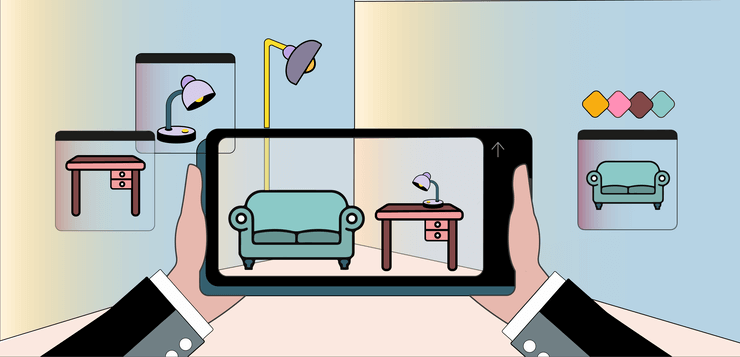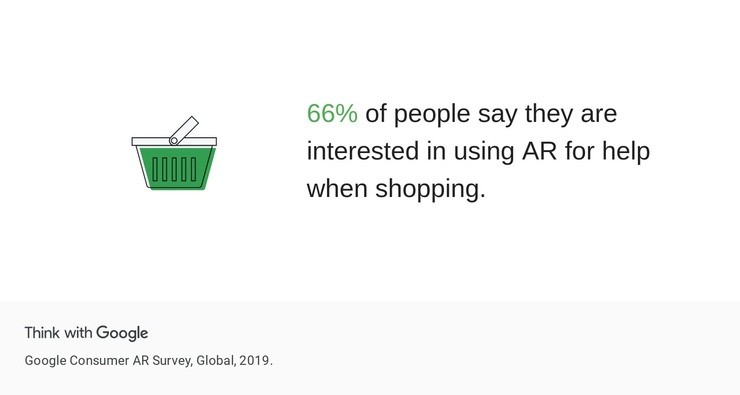We use cookies and similar technologies to enhance your experience. By clicking “Accept All,” you agree to the use of all cookies detailed in our Privacy Policy You can manage your preferences or withdraw your consent at any time
The Future of Augmented Reality: AR, Metaverse & eCommerce
Back to the Future II imagined a future filled with flying cars, waste-fueled vehicles, and auto-drying jackets. While their future doesn’t match our reality exactly, they got some developments right. One of the said advances is Augmented Reality, and hey, the film actually predicted Google Glass!
Augmented Reality’s been becoming a part of our lives at an increasing rate for the past few years, especially with the help of smartphones and their cameras. AR technology allows our gadgets to perceive the world as we do: visual, immersive and in three dimensions.
Here’s a fun game before we start: Have you googled the word “shark” lately? No, I’m not asking this just because I’ve recently rewatched Spielberg’s Jaws. Google has a little augmented reality surprise if you do so: When you google certain animals, you will see a card that says, “Meet a life-sized [animal] up close”. There’s even a “View in your space” option! Don’t you want to know how a great white shark would look in your kitchen?
Okay, but seriously why Augmented Reality?
The most obvious advantage of employing AR technologies in eCommerce is that it allows customers to try the products virtually. The other advantages benefits accessibility and portability: You need a smartphone or, in some cases, special AR glasses.
So how can eCommerce stores use augmented technologies?
Let’s take a look at how AR can help eCommerce.
Virtual try-on
You can never know how a jacket will look on you for sure unless you try it on. However, this was not a possibility with online shopping for quite some time. In the old times, online shopping usually went down like this: You’d see a jacket on some online store and decide it looks amazing on the model and order it. It’d arrive, and when you try it on, you’d see that it doesn’t suit you at all. So, you’d end up sending it back. All that time was wasted! Or there’s the scenario that you order nothing at all because you are not sure how it will look, and you don’t want to go through the trouble of sending it back in case it doesn’t suit you. The result? Lower conversion rates.
This particular type of AR technology allows the customers to try the products on, whether it’s a pair of sunglasses or a particular shade of lipstick. One of the most impressive examples of this comes from Sephora. In 2017, they introduced the “Sephora Virtual Artist” update to their app. The app employs facial recognition technology to let you try on various products! In addition, they also offer virtual tutorials specific to you!
And Google has taken things a step further with Google Lens: Let’s say you see a sweater that you liked while mindlessly scrolling through your Instagram feed. Take a screenshot and use Google Lens to see how other people have styled it! Or let’s say you saw a dress in the store but can’t imagine how to style it. Just open Lens and point your camera!

Preview placement
Buying a piece of furniture such as a sofa or a dinner table is kind of a huge commitment. It’s natural to want to know if it will fit in your living room.
IKEA’s “Place” app allows you to virtually place their products in your spaces, and it’s been around since 2017! Lately, they have been working on another app that will enable you to design a whole room! They’ve collaborated with SPACE10, a Copenhagen-based future living lab, for this project.
Interactive user manuals
User manuals are confusing and infuriating. Even the mere thought of those black and white illustrations marked with numbers and not-so-clear instructions are discouraging. Who even reads them anyway? Luckily, AR is here to make our lives a bit easier! These interactive user manuals aim to provide the user with…well, interactive instructions. They do this by using digital images based on how we view the world and overlaying instructions and obviously, with the help of some sophisticated Artificial Intelligence. Interactive manuals can be especially useful for complex products. Mercedes Benz was one of the first companies to realise the potential of AR manuals in customer support.
Have you heard about the Metaverse?
The term “metaverse” was coined by Neal Stephenson in his 1992 science fiction novel, Snow Crash, where human avatars and software daemons interact with one another in a 3D virtual world. Since then, the metaverse concept has been a staple trope for dystopian science fiction realms, where the virtual world provides an escape from the corrupt and undesirable reality. Think of The Matrix or Ready Player One. Nowadays, the term’s got the attention of tech giants, such as Microsoft and Facebook.
This version of metaverse envisions that you and your colleagues can be in different parts of the world and still be able to sit down in the same virtual meeting room instead of staring at the 2D screen of your laptop on Zoom. With spatial audio and everything else to make it feel more real! Afterwards, you could grab a coffee at a virtual coffee shop with a friend who lives on the other side of the country! At the end of Back to the Future I, Doc Brown says, “Where we’re going, we don’t need roads.” Bet this wasn’t what the writers had in mind when they wrote the line!
Zuckerberg announced that Facebook will become a “metaverse company”
Mark Zuckerberg announced that Facebook would become a metaverse company. His vision for Facebook is that it will not be just a social media company. There’s been some criticism about Facebook’s metaverse, calling it “VR re-branded”. Of course, Facebook’s VR arm Oculus and its VR Network Horizons could be of help in this pursuit. However, the goal is to create wearable technology that is easy to use outside, such as AR glasses, according to the Facebook CEO.
Zuckerberg had previously announced that Facebook’s next hardware launch would be “smart glasses” in partnership with Ray-Ban. He had called them “journey towards full augmented reality glasses in the future”. We got an early glimpse into this collaboration due to a leak right before its official launch.
Afterwards, on September 9, Facebook and Ray-Ban officially announced what they named “Ray-Ban Stories”. While they’re pretty limited in their abilities and not quite what’s expected based on the ambitious words of the Facebook CEO, they are the most normal-looking smart glasses on the market. The frames are built in the classic form that Ray-Ban is known for.
Additionally, Zuckerberg seems to think of metaverse as something a lot bigger than playing a video game with your VR headset on. He’s spoken of a whole new type of economy revolving around the metaverse: We’d get to go to concerts; creators of all kinds would design different experiences for the public; we’d get to bring our clothes & digital objects with us, and teleport anywhere etc. Maybe what the Facebook CEO is envisioning is not that distant of a future.
The legendary Swedish pop band ABBA has recently announced their first album, The Voyage, nearly 40 years after breaking up! And what a comeback! The new album will be accompanied by a rather interesting concert: The digital avatars of the band members will be performing with a live band! ABBA members have been digitised into their younger selves using motion-capture technology, designed by Industrial Light & Magic, a company founded by George Lucas. It’s not quite yet what Zuckerberg’s talking about, but we’re likely to get there sooner than we think.
Digital marketing in the metaverse
According to Zuckerberg, the key source of revenue in the metaverse will be ads, much like today. If his vision comes to life, this means a new era for digital marketing. Sure, marketing has always evolved according to technological developments and trends, but this has the potential to be marketing’s most ambitious change to this day. For starters, metaverse will change the nature of the relationship between brand and their customers. They will have to deal with a new reality, so to speak. Obviously, the change will not happen overnight. The brands will have to come up with new and creative ways to interact with their customers, and it will take time.
Another critical point is that metaverse will not belong to and be operated by one single company. It will be a collaborative ecosystem, much like the Internet today. In fact, metaverse has been called the thing that will come after the Internet – Internet 2.0, if you will.

Augmented Reality is no longer just mere science-fiction
AR technology is not wild speculation of the sci-fi genre anymore. It’s a promising and game-changing solution for the online retail world. In fact, according to a Google Consumer Survey, 66% of people say they are interested in using AR for help when shopping. Employing AR technology in eCommerce offers reduced return rates for online stores and better customer support for the consumers. It is also a great means to getting the attention of potential customers for the brand.
Let’s be honest; the best thing about some of the features we’ve discussed is that they are extremely fun and engaging! Of course, I’d love to see how every single coffee table on the catalogue would look in my living room! And of course, I’d tell my friends and family about that cool new feature!
Certainly, we will hear about augmented technologies and metaverse more in the years to come. The venture capitalist Matthew Ball wrote a nine-piece essay discussing a framework for the metaverse and what the metaverse could become. Referring to this essay, Zuckerberg has explained how things in the tech world don’t exactly go according to what’s envisioned. So we’ll just have to wait and see what the future and technology will bring for augmented reality and metaverse.








